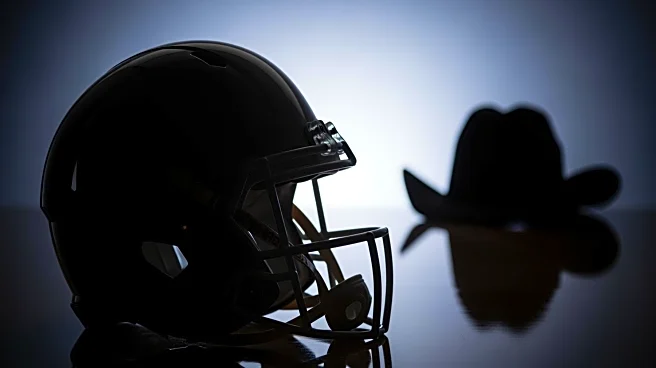What's Happening?
Dallas Cowboys head coach Brian Schottenheimer expressed his condolences following the tragic death of Marshawn Kneeland, a 24-year-old athlete who died by suicide in Frisco, Texas. During a press conference,
Schottenheimer shared heartfelt memories of Kneeland, highlighting his playful spirit and exceptional athleticism. The Cowboys have decided to honor Kneeland by wearing a special helmet decal for the remainder of the season. Additionally, the team has established the 'Marshawn Kneeland Memorial Fund' to support Kneeland's girlfriend, Catalina, who is pregnant. This initiative reflects the team's commitment to honoring Kneeland's legacy and supporting his family during this difficult time.
Why It's Important?
The death of Marshawn Kneeland has deeply affected the Dallas Cowboys organization, highlighting the importance of mental health awareness and support within professional sports. By establishing a memorial fund, the Cowboys are taking proactive steps to provide financial assistance to Kneeland's family, demonstrating a compassionate response to the tragedy. This action may encourage other sports teams to prioritize mental health initiatives and support systems for athletes. The team's decision to wear a helmet decal serves as a public tribute, raising awareness about the impact of suicide and the need for community support.
What's Next?
The Dallas Cowboys are set to play against the Raiders in Las Vegas on 'Monday Night Football,' marking their first game since Kneeland's passing. This event will likely be an emotional moment for the team as they continue to honor Kneeland's memory. The memorial fund is expected to provide ongoing support to Kneeland's family, and the team's actions may inspire similar initiatives across the NFL. As the season progresses, the Cowboys may further integrate mental health awareness into their community outreach efforts, potentially influencing broader discussions on athlete well-being.
Beyond the Headlines
The establishment of the 'Marshawn Kneeland Memorial Fund' not only provides immediate support to Kneeland's family but also highlights the ethical responsibility of sports organizations to address mental health issues. This initiative could lead to long-term changes in how teams approach mental health, encouraging the development of comprehensive support systems for athletes. The public tribute through helmet decals may also foster a cultural shift, promoting open conversations about mental health and reducing stigma within the sports community.









